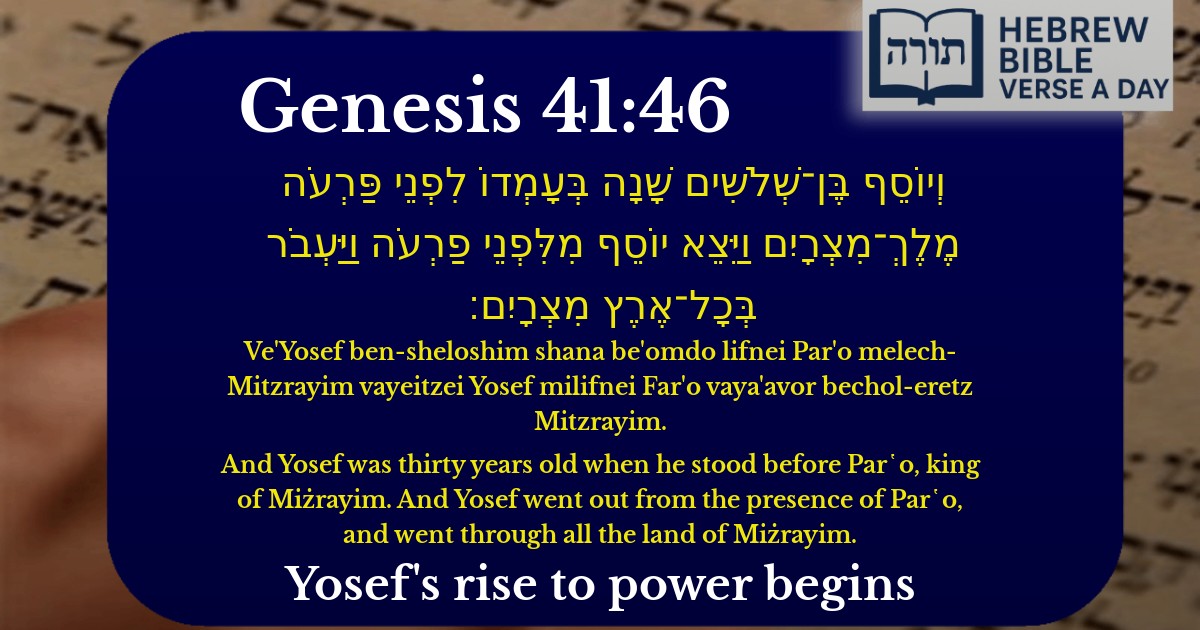Join Our Newsletter To Be Informed When New Videos Are Posted
Join the thousands of fellow Studends who rely on our videos to learn how to read the bible in Hebrew for free!
Hebrew Text
וְיוֹסֵף בֶּן־שְׁלֹשִׁים שָׁנָה בְּעָמְדוֹ לִפְנֵי פַּרְעֹה מֶלֶךְ־מִצְרָיִם וַיֵּצֵא יוֹסֵף מִלִּפְנֵי פַרְעֹה וַיַּעְבֹר בְּכָל־אֶרֶץ מִצְרָיִם׃
English Translation
And Yosef was thirty years old when he stood before Par῾o, king of Miżrayim. And Yosef went out from the presence of Par῾o, and went through all the land of Miżrayim.
Transliteration
Ve'Yosef ben-sheloshim shana be'omdo lifnei Par'o melech-Mitzrayim vayeitzei Yosef milifnei Far'o vaya'avor bechol-eretz Mitzrayim.
Hebrew Leining Text
וְיוֹסֵף֙ בֶּן־שְׁלֹשִׁ֣ים שָׁנָ֔ה בְּעׇמְד֕וֹ לִפְנֵ֖י פַּרְעֹ֣ה מֶֽלֶךְ־מִצְרָ֑יִם וַיֵּצֵ֤א יוֹסֵף֙ מִלִּפְנֵ֣י פַרְעֹ֔ה וַֽיַּעֲבֹ֖ר בְּכׇל־אֶ֥רֶץ מִצְרָֽיִם׃
וְיוֹסֵף֙ בֶּן־שְׁלֹשִׁ֣ים שָׁנָ֔ה בְּעׇמְד֕וֹ לִפְנֵ֖י פַּרְעֹ֣ה מֶֽלֶךְ־מִצְרָ֑יִם וַיֵּצֵ֤א יוֹסֵף֙ מִלִּפְנֵ֣י פַרְעֹ֔ה וַֽיַּעֲבֹ֖ר בְּכׇל־אֶ֥רֶץ מִצְרָֽיִם׃
🎵 Listen to leining
Parasha Commentary
📚 Talmud Citations
This verse is not quoted in the Talmud.


Yosef's Age and Leadership
The verse states that Yosef was thirty years old when he stood before Pharaoh. Rashi (on Bereishit 41:46) notes that this age marks a transition to full maturity and leadership, as seen in other biblical figures like David (Shmuel II 5:4) and Yechezkel (Yechezkel 1:1). The number thirty symbolizes strength and readiness for responsibility, as the Mishnah (Avot 5:21) teaches that thirty is the age for "koach" (strength).
Yosef's Departure from Pharaoh's Presence
The phrase "וַיֵּצֵא יוֹסֵף מִלִּפְנֵי פַרְעֹה" ("And Yosef went out from the presence of Pharaoh") is interpreted by the Midrash (Bereishit Rabbah 90:4) as highlighting Yosef's humility. Despite his sudden rise to power, he did not linger arrogantly before the king but immediately set out to fulfill his duties. The Rambam (Hilchot De'ot 2:3) emphasizes that true leadership requires humility and action, not self-aggrandizement.
Surveying the Land of Egypt
The verse concludes by stating that Yosef "went through all the land of Egypt." The Sforno (on Bereishit 41:46) explains that this demonstrates Yosef's diligence in personally overseeing the preparation for the famine, rather than delegating blindly. The Talmud (Sotah 11a) connects this to the broader theme of divine providence—Yosef's journey through Egypt was part of Hashem's plan to position him as a savior for both Egypt and his own family.